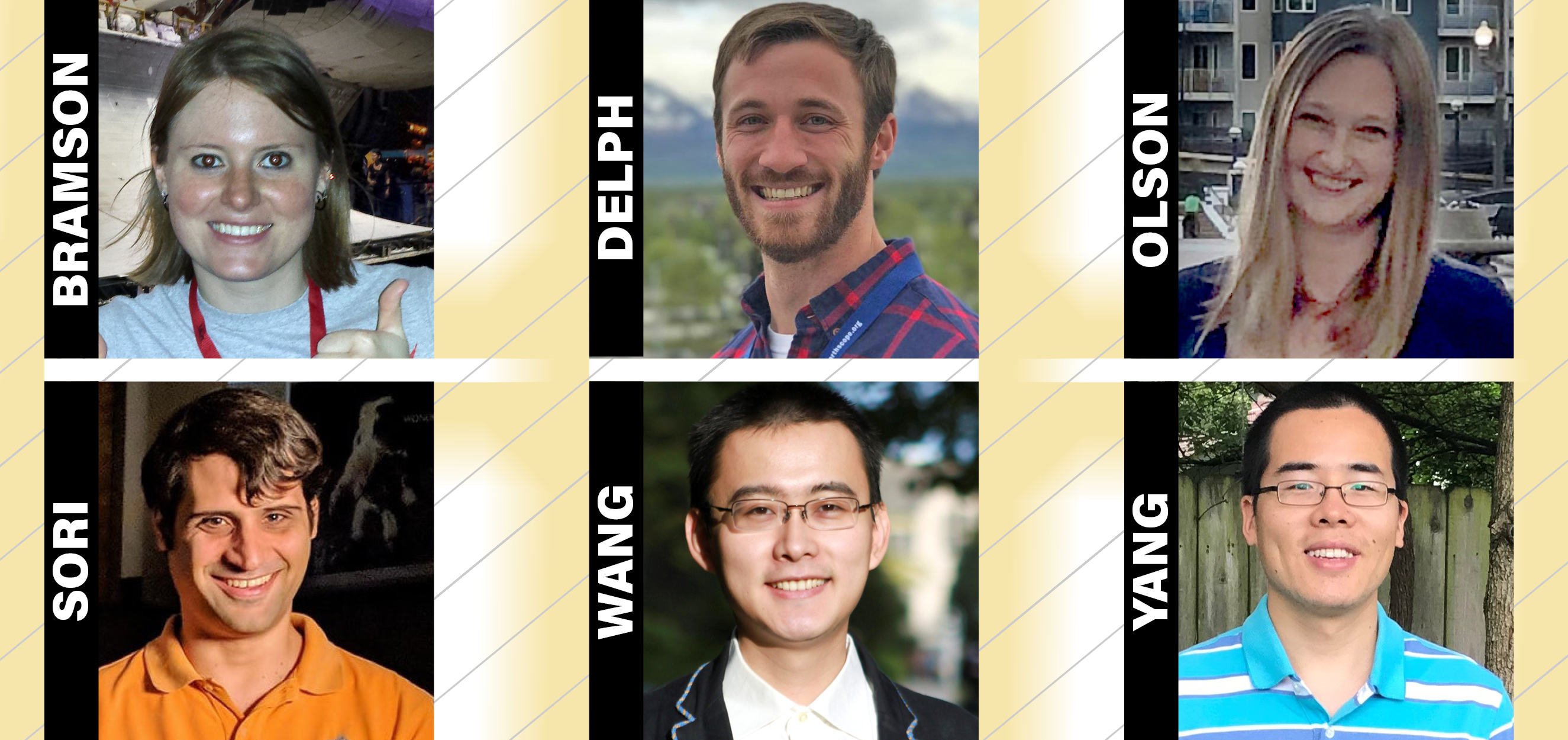Meet the new faculty for the Department of Earth, Atmospheric, and Planetary Sciences at Purdue University
08-27-2020
Writer(s): Cheryl Pierce

Hiring experts in the field is a top priority for the Department of Earth, Atmospheric, and Planetary Sciences at Purdue University (EAPS) so that these faculty can lead Boilermakers to promising careers and academic pursuits. EAPS welcomes six new faculty for the 2020-2021 academic year.
Dr. Ali Bramson
Professor Bramson joins the Planetary Group. Her research specialties include planetary surface processes, ice on Mars, and working with spacecraft data. She is teaching EAPS 353 (Earth and Planetary Surface Processes) and helping out with EAPS 602 (New Graduate Student Seminar) this fall. In the coming years, she plans to create a new course on mapping the planets.
“I am extremely excited to be coming to the ‘Cradle of Astronauts’ as a professor,” says Bramson. “Purdue's legacy and dedication to space exploration is special, and perfectly aligned with my research and career goals, which are focused on understanding the surfaces of planets and ice in our Solar System via NASA interplanetary spacecraft missions. Being at Purdue also means the opportunity to teach and work with amazing students who share my passion for space exploration.”
Dr. Jonathan Delph
Professor Delph is involved with Earth geology and geophysics and specializes in seismology and tectonics. He will be teaching EAPS 591 (Global Tectonic Systems) which focuses on Earth evolution and research controversies. He enjoys teaching courses at the intersection of geology/tectonics and geophysics. As a seismologist and geologist, he may expand into teaching geology, geophysics, and computational analysis courses.
“My research focuses on applied seismic methodologies - that is, how seismic wave properties relate to fundamental tectonic processes on Earth,” says Delph. “To date, I've researched the lithospheric-scale structure of magma systems below supervolcanoes, the resiliency of cratonic regions to subsequent tectonic events, how the transition from subduction to collision controls surface processes (e.g., uplift, magmatism, and deformation), and how the character of slip on a subduction interface relates to surface topography and the presence of fluids. Purdue has devoted a great deal of resources into developing a nationally-renowned supercomputer infrastructure. Access to these computational resources will allow me to pursue innovative research at a scale that would otherwise be impossible. Therefore, coming to Purdue was an easy decision.”
Dr. Stephanie Olson
Professor Olson specializes in Earth system evolution, planetary habitability, and exoplanet life detection. Because her research is strongly interdisciplinary and overlaps quite a bit with both Earth and Atmospheric sciences, she will be able to span all aspects of EAPS. She will be teaching Astrobiology in the Spring, and will develop an exoplanets course in the future.
“I'm excited to join a vibrant community and to bring the search for life beyond our solar system to Purdue EAPS,” says Olson.
Dr. Mike Sori
Professor Sori joins the Planetary Group and his research specializes in planetary geophysics and will teach planetary interiors and geodynamics. He will begin teaching during the spring semester.
“Purdue very quickly became one of the top universities for planetary science in recent years,” says Sori. “It's inspiring to be surrounded by so many excellent planetary scientists at a place that is unapologetically ambitious. I have no doubt that the planetary group here is going to accomplish special things.”
Dr. Lei Wang
Professor Wang joins the Atmospheric Group and specializes in large-scale atmospheric dynamics. His interests also encompass interdisciplinary branches of EAPS, and he plans to collaborate with extreme weather experts on topics like weather-climate continuum and climate change, geodata science experts on data-informed climate dynamics, and members of the Planetary Group on topics like planetary atmosphere and habitability. He will be teaching a grad-level intro fluid dynamics and one upper-level undergraduate / grad large-scale dynamics course.
“I am deeply impressed by the inter-discipline environment at Purdue EAPS, and I am excited to contribute my expertise in large-scale atmospheric dynamics to EAPS,” says Wang. “My favorite quote is 'to think deeply about simple things.' This has shaped up my teaching and research philosophy. In my course, I will encourage and train students to go deep into simple yet elegant toy models. I also look forward to working on fundamental research problems together with EAPS students and colleagues.”
Dr. Xiaotao Yang
Professor Yang is a seismologist, specializing in using seismological methods and high-performance computing resources to solve geological/tectonic problems and to understand natural hazards. He is interested in and has contributed to a variety of research topics, including intraplate seismicity, structure and evolution of intracratonic basins and uplifts, dynamics of subduction zones, and improvements in seismic data processing methods. As a long-term interest, he aims to integrate results from multidisciplinary research fields, including geology, geophysics, geochemistry, and geodynamics in addressing tectonic questions. He looks forward to expanding his future research in other areas of EAPS. He is co-teaching the G602 New Grad Seminar this fall, which aims to help new graduate students have better research and learning experience in the EAPS department.
“It is exciting to join the Boilermaker team! My long-term interests in both research and teaching lead me to academia,” says Yang. “Purdue is the best fit for my career development, with the best student diversity, the state-of-the-art computing resources, and the strongest support on interdisciplinary collaborations. It is the best university to fulfill my passion for research and education in Earth sciences. I can’t wait to work with our students and colleagues at EAPS and beyond!”